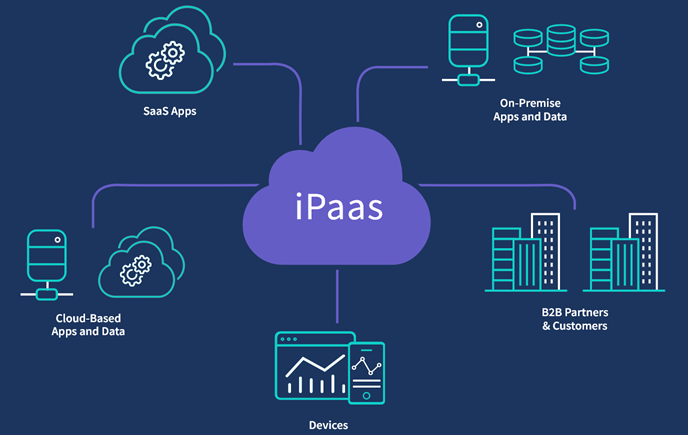Inquire
Integration Platform as a Service (iPaaS): Streamlining Business Connectivity in the Digital Age

In today's hyper-connected world, businesses rely on a growing number of applications and data sources to deliver products, services, and digital experiences. As the complexity of these systems increases, organizations face mounting challenges in integrating cloud-based and on-premises technologies seamlessly. This is where Integration Platform as a Service (iPaaS) has emerged as a powerful solution, helping enterprises to unify disparate systems and orchestrate workflows across platforms effortlessly.
iPaaS is a cloud-based integration platform that enables businesses to develop, execute, and manage integration flows between various applications and data sources without the need for on-premises hardware or complex coding. It acts as a central hub, connecting software-as-a-service (SaaS) applications, databases, and legacy systems, ensuring that information flows smoothly across different environments. This cloud-native approach aligns well with modern business models that prioritize agility, scalability, and digital transformation.
One of the defining characteristics of iPaaS is its ability to handle multiple integration scenarios — from simple point-to-point integrations to complex enterprise-level orchestrations. With pre-built connectors, drag-and-drop interfaces, and real-time data processing, iPaaS platforms empower business users and IT teams alike to create and manage integrations faster and more efficiently. This results in improved operational efficiency, reduced IT burden, and faster time to market.
The rise of iPaaS is driven by the growing adoption of cloud applications, data silos, and hybrid IT environments. Companies often use a mix of SaaS tools such as Salesforce, Microsoft 365, Shopify, and NetSuite alongside traditional ERP systems. Without a centralized integration strategy, these tools operate in isolation, leading to fragmented data, delayed decision-making, and poor customer experiences. iPaaS resolves these issues by enabling real-time synchronization and automated workflows across all systems, providing a unified view of operations.
iPaaS also plays a crucial role in enabling digital transformation initiatives. By integrating systems and enabling data sharing, organizations can automate repetitive tasks, enhance collaboration, and derive insights from connected data sources. This capability is especially valuable for businesses operating in fast-moving sectors such as finance, healthcare, retail, and logistics, where timely data access and efficient workflows are essential for success.
Security and compliance are also integral features of modern iPaaS platforms. As data travels between cloud and on-premises systems, iPaaS providers ensure that integration processes adhere to industry standards and data privacy regulations. With built-in governance controls, encryption protocols, and audit trails, organizations can maintain data integrity and trust while scaling their operations globally.
Moreover, the flexibility of iPaaS makes it suitable for both small businesses and large enterprises. Startups can use iPaaS to connect their CRM and e-commerce systems quickly, while larger organizations benefit from advanced capabilities such as API management, data mapping, and complex event processing. The subscription-based pricing model and the elimination of infrastructure overhead further make iPaaS a cost-effective integration solution for businesses of all sizes.
The competitive iPaaS market is populated by leading providers such as MuleSoft, Boomi, Informatica, Jitterbit, SnapLogic, and Workato. Each platform offers unique features, but all aim to simplify integration complexities, enhance connectivity, and improve business agility. As vendors continue to innovate, we can expect iPaaS to incorporate advanced technologies like AI, machine learning, and low-code development tools to further streamline the integration process and empower citizen developers.
Recent industry trends also highlight a shift towards event-driven and API-led integration models within iPaaS platforms. These advancements enable real-time responsiveness, allowing systems to trigger actions automatically based on data changes or user behavior. For example, an iPaaS solution can instantly notify a sales team when a high-value customer places an order or initiate a supply chain process when inventory levels drop below a threshold.
The future of iPaaS looks promising as digital ecosystems become more complex and interconnected. With the rise of IoT, edge computing, and artificial intelligence, the need for agile integration solutions will continue to grow. iPaaS is well-positioned to support this evolution, enabling businesses to stay competitive, data-driven, and customer-focused in an ever-changing technological landscape.
Source - https://www.marketresearchfuture.com/reports/integration-platform-as-a-service-market-5519
Integration Platform as a Service (iPaaS) has become a cornerstone of digital business strategies. It empowers organizations to bridge the gap between siloed systems, accelerate innovation, and respond to market demands with greater agility. By adopting iPaaS, businesses not only enhance their operational efficiency but also future-proof their IT infrastructure in a cloud-first era. As integration needs evolve, iPaaS will remain a vital enabler of seamless, scalable, and secure digital transformation.
- Managerial Effectiveness!
- Future and Predictions
- Motivatinal / Inspiring
- Other
- Entrepreneurship
- Mentoring & Guidance
- Marketing
- Networking
- HR & Recruiting
- Literature
- Shopping
- Career Management & Advancement


 SkillClick
SkillClick